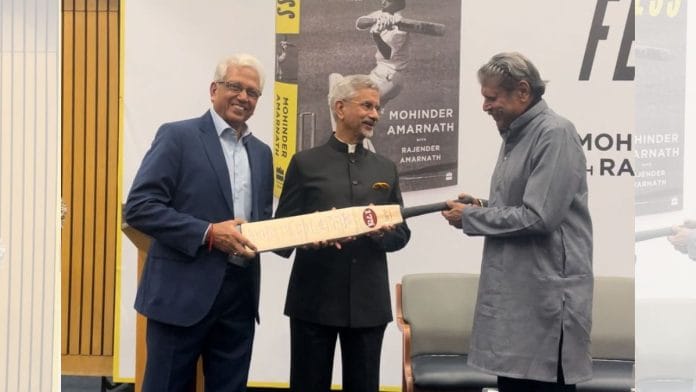New Delhi: At the launch of former Indian cricketer Mohinder Amarnath’s latest book, External Affairs Minister S Jaishankar broke a long-held stereotype—that diplomacy is like playing a game of chess. He, in fact, chose cricket to be a better representative.
“People often compare foreign policy with chess, but it’s far more like cricket. Because, first, there are many players. Two, the playing conditions keep varying. Playing at home and playing abroad are very different. There are many formats. You are at the umpire’s whims at times.”
HarperCollins India hosted the much-anticipated launch of Fearless: A Memoir, written by Mohinder Amarnath with his brother Rajender, at the India International Centre on 28 November. The event drew cricket legends like Kapil Dev, Kirti Azad, Virender Sehwag, and Anjum Chopra, among others.
The seminar hall buzzed with excitement, with guests aged from seven to 70, including mediapersons, friends and family. Fans eagerly lined up for autographs on their copies of the book and posed for photos with the cricketing icons.
A highlight of the evening was when Mohinder Amarnath gifted S Jaishankar, the chief guest, a bat signed by the entire 1983 World Cup-winning team.
In his address, the EAM mentioned how in both cricket and diplomacy, at the end of the day, a lot of it is about psychology, trying to outthink the other team, trying to get into their heads.
“Every time you go out there to do your business, it is actually that competitive spirit that you tell yourself, ‘I have to win this’,” he added.
Candid revelations
In his memoir, Mohinder Amarnath boldly picks Imran Khan over Sunil Gavaskar as the better captain, citing Khan’s inclusive leadership style.
“Gavaskar was a phenomenal batsman, one of the best. But he expected others to match his standards and didn’t always connect with younger players. Imran, on the other hand, created an inclusive and happy team environment,” Amarnath explained in a conversation with RevSportz editor Boria Majumdar.
Co-author Rajinder Amarnath defended his candid take, calling it an honest reflection of Jimmy Ormond’s cricketing journey.
The memoir also reveals several anecdotes, including how Mohinder Amarnath learned about his selection for the 1983 World Cup from a friend in the UK—not the BCCI.
“Maybe they had a very low estimation of the team based on how we performed in 1975 and 1979. Maybe, that’s why they did not bother much with the 1983 team,” he said.
Mohinder Amarnath’s career was a rollercoaster of highs and lows: from lifting the World Cup in 1983 to enduring team exclusions, controversies, and mental health struggles.
Through it all, the cricketer’s father, Lala Amarnath, remained his unwavering guide.
“His first advice was simple: play cricket and become somebody in life. He believed that cricket offered opportunities beyond the ordinary, shaped by his unique worldview and experiences,” Mohinder Amarnath recalled.
Addressing his infamous “bunch of jokers” remark about selectors, Mohinder Amarnath admitted it was born out of frustration.
“I was repeatedly dropped without explanation. I asked papaji, and he supported me in whatever I chose to do. That statement came from sheer disappointment,” he said.
Also read: IAS officer-turned-politician KJ Alphons now a self-help guru. ‘Your hurters are your helpers’
‘Man of the match’
True grit, stout-hearted, a strong ribcage, never say die, absolutely reliable, selfless, a future generation model. These were some terms Jaishankar used to define Mohinder Amarnath.
Highlighting Amarnath’s resilience, Jaishankar said he often uses the cricketer’s journey to inspire others: “If I have to tell someone to hang in there, take it on the chin, and stand their ground, you’re the analogy I use.”
Drawing parallels between India’s transformation and cricket, Jaishankar called the 1983 World Cup victory an “inflection point”. Cricket, from there on, became India’s soft power.
“Pakistan and Sri Lanka have won World Cups, but nowhere was it as transformative as for India. It changed our role in global cricket, and Mohinder Amarnath wasn’t just a part—he was the man of the match at that inflection point,” he said.
Mohinder Amarnath, touched by Jaishankar’s words, explained why he invited the minister as the chief guest for his book launch.
“I was sitting in my chair, listening to music, and thinking who should I call to unveil my book,” Amarnath recalled.
“Suddenly the song ‘Jai Jai Shivshankar’ played in my head. That’s when it clicked—I emailed Jaishankar, not expecting a reply, but within hours, he confirmed.”
Mohinder Amarnath at various points in the book has avoided naming certain cricketers, a point even noted by the EAM.
Concluding the evening, Amarnath’s 1983 skipper, Kapil Dev suggested, “There should be a sequel to Fearless—with all the names included.”
(Edited by Aamaan Alam Khan)






